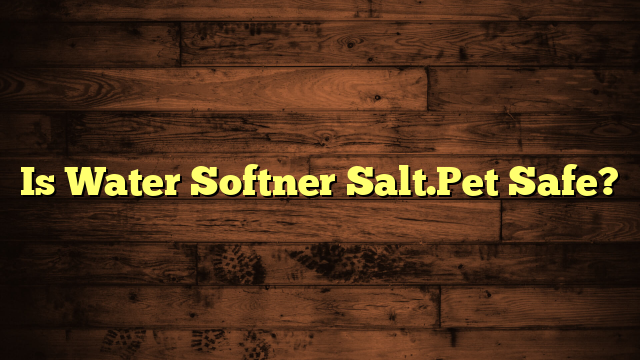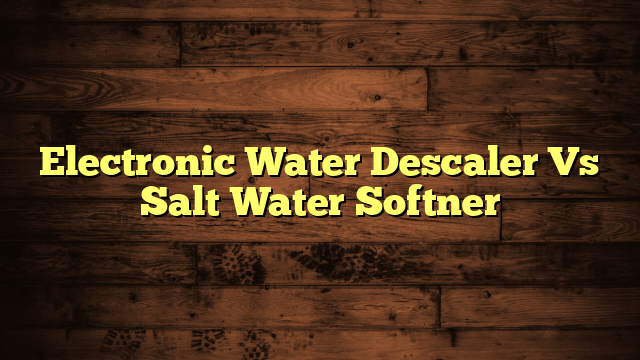Is Water Softner Salt.Pet Safe?
When you think about your pet's safety, water softener salt might not be the first thing on your mind, but it should be. This common household item poses potential risks for pets, from serious health issues to skin irritations. You might be surprised to learn just how toxic it can be if ingested or even touched. So, what steps can you take to minimize these risks and guarantee a safe environment for your furry friends?
Key Takeaways
- Water softener salt can be harmful to pets if ingested, causing vomiting, diarrhea, and lethargy.
- Skin contact with water softener salt may lead to irritation, redness, and itching in pets.
- Environmental leaching from salt can harm wildlife, and pets may absorb toxins through contaminated soil.
- Potassium chloride is a safer, pet-friendly alternative to traditional water softener salt.
- Store water softener salt securely and monitor pets for signs of toxicity to ensure their safety.
Understanding Water Softener Salt
When it comes to water softener salt, many people mightn't realize its composition and purpose. This salt is essential for various water softener types, helping to reduce hard minerals like calcium and magnesium in your water supply. By doing so, it prevents scale buildup in your plumbing and appliances, ultimately extending their lifespan.
You'll find that the most common types of water softener salt include rock salt, solar salt, and evaporated salt, each varying in purity and cost. Rock salt is the least processed but may contain impurities, while evaporated salt is the purest option, perfect for those who want maximum efficiency.
If you're looking for salt alternatives, consider potassium chloride, which can soften water without the sodium content. However, it's worth noting that potassium chloride may not be as effective in some systems.
Understanding the different options available helps you make informed decisions about what works best for your household.
How Water Softener Works
Water softeners operate through a straightforward process that involves ion exchange, effectively reducing hard minerals in your water.
When hard water enters the system, it first goes through a tank filled with resin beads. These water softener components are coated with sodium ions. As the hard water flows through the tank, the calcium and magnesium ions—responsible for hardness—are attracted to the resin beads.
During this ion exchange process, the resin captures the calcium and magnesium ions while releasing sodium ions back into the water. This exchange effectively softens the water, making it gentler on your skin, clothes, and plumbing.
After a period of time, the resin beads become saturated with hard minerals. At this point, the system will initiate a regeneration cycle, where a brine solution, composed of salt and water, cleans the resin beads, restoring their sodium coating.
This cycle of ion exchange and regeneration guarantees that you always have soft water available. Understanding how your water softener works can help you maintain it effectively, guaranteeing peak performance and longevity for your system.
Potential Risks to Pets
When it comes to your pets, you should be aware of the potential risks associated with water softener salt.
Ingesting this salt can lead to serious health issues, while contact with their skin might cause irritation.
Furthermore, if it leaches into the environment, it can harm local wildlife and ecosystems, making it essential to understand these hazards.
Ingestion Hazards
Many pet owners may not realize that ingestion of water softener salt can pose significant risks to their furry friends. If your pet accidentally consumes this substance, you should be aware of the potential ingestion symptoms. These can include excessive thirst, vomiting, diarrhea, and lethargy.
In more severe cases, your pet might display signs of confusion or seizures, which can be alarming. Pay close attention to your pet's behavior after any potential exposure. Changes like increased restlessness or a lack of appetite can indicate distress.
It's vital to act quickly; if you suspect your pet has ingested water softener salt, contact your veterinarian immediately. They can guide you on the next steps, which may include inducing vomiting or providing supportive care.
To prevent these situations, store water softener salt in secure containers and keep them out of reach of your pets. Understanding ingestion hazards is fundamental for keeping your furry companions safe.
Skin Irritation Risks
In addition to ingestion hazards, water softener salt can also lead to skin irritation for pets. If your pet comes into contact with salt residue after you've used a water softener, they might experience skin sensitivity. This can manifest as redness, itching, or even sores.
It's important to pay attention to your pet's skin, especially if you notice them scratching or licking excessively. Some pets may have allergic reactions to the chemicals in water softener salt, which can exacerbate skin issues.
Dogs, for example, may develop hives or rashes, while cats might experience more localized irritation. If you suspect your furry friend is having a reaction, it's best to consult a veterinarian for guidance and treatment options.
To minimize risks, always rinse your pet's paws after walks in areas where salt is present. Keeping your home clean and free from salt residue can also help protect your pet's skin.
Environmental Contamination Effects
Environmental contamination from water softener salt can pose significant risks to pets, especially when it seeps into soil and waterways. As the salt runoff from your water softener enters the environment, it contributes to water pollution, affecting local ecosystems and wildlife.
Your pets mightn't directly consume contaminated water, but they can still be at risk when they play or explore areas near affected bodies of water. The salt can disrupt the natural balance of freshwater systems, leading to higher salinity levels that harm aquatic life. Fish and other creatures may struggle to survive, which can indirectly affect your pets if they're accustomed to catching or consuming these animals.
Furthermore, when pets walk on contaminated soil, they can absorb harmful substances through their paws, potentially leading to health issues.
To protect your furry friends, consider implementing eco-friendly water softening solutions or exploring alternatives that minimize environmental impact. Monitoring water usage and ensuring proper disposal of excess salt can also help reduce contamination risks.
Signs of Salt Poisoning
When pets ingest too much salt, they can show several troubling signs of salt poisoning. It's vital to recognize these symptoms early to guarantee a quick emergency response. Here are some common signs to look out for:
| Symptom | Description |
|---|---|
| Vomiting | Frequent expulsion of food or liquid. |
| Diarrhea | Loose or watery stools, often accompanied by urgency. |
| Excessive Thirst | Increased water consumption beyond normal levels. |
| Lethargy | Noticeable decrease in energy or alertness. |
| Seizures | Sudden, uncontrolled electrical activity in the brain. |
If you notice these symptoms, quick symptom identification is key. Salt poisoning can lead to severe health issues, and immediate veterinary attention may be necessary. Don't hesitate to contact your vet if you suspect your pet has consumed a dangerous amount of salt. Understanding these signs can help you act decisively, guaranteeing your furry friend receives the care they need as soon as possible. Remember, being aware of these warning signs is the first step in protecting your pet's health.
Safe Alternatives to Salt
If you're looking for safe alternatives to traditional salt for your water softener, you might want to contemplate potassium chloride, vinegar, or baking soda.
Potassium chloride can effectively soften water while being less harmful to pets, and vinegar is an eco-friendly option that can help reduce hardness without the risks associated with salt.
Baking soda is another versatile solution that not only softens water but also neutralizes acidity, making it a great choice for pet-safe households.
Potassium Chloride Benefits
Potassium chloride offers a safe alternative to traditional water softener salt, especially for pet owners concerned about their furry friends' health. This compound is derived from natural potassium sources, making it a more pet-friendly option compared to sodium chloride.
By using potassium chloride in your water softening system, you reduce the risk of sodium toxicity in pets, as high sodium levels can lead to health issues.
In addition to being safer for pets, potassium chloride has various applications. It's often used in fertilizers, food processing, and even medical treatments, showcasing its versatility.
When you choose potassium chloride for your water softener, you're not just protecting your pets; you're also making an environmentally conscious choice.
Moreover, potassium chloride helps maintain the balance of essential minerals in your water, improving its quality for both you and your pets. This means cleaner, softer water that can be gentler on your pet's skin and coat.
Vinegar Water Softening
Many pet owners are exploring vinegar as a natural alternative for softening water, providing a safe and effective solution without the use of traditional salt.
Vinegar benefits extend beyond just culinary uses; it can effectively soften water and improve its quality, making it safe for your furry friends.
When considering vinegar for water softening, here are some key advantages:
- Non-toxic: Vinegar is safe for pets, unlike many chemical softeners.
- Cost-effective: It's an affordable option compared to commercial water softeners.
- Environmentally friendly: Vinegar is biodegradable and won't harm the planet.
- Versatile: It can be used for cleaning and deodorizing, too!
- Mineral balance: It helps maintain essential minerals in water, promoting better health.
Baking Soda Solutions
While vinegar offers a natural method for softening water, baking soda is another pet-safe alternative that can be just as effective. This versatile compound has numerous baking soda benefits, making it a fantastic addition to your home care routine.
Not only does it help soften water, but it also works as a powerful cleaning solution. To use baking soda for water softening, simply add it to your laundry or dishwashing machine. It counteracts hard water minerals, improving the effectiveness of your detergent. Plus, it's safe for pets, meaning you won't have to worry about any harmful effects on your furry friends.
In addition to its water-softening properties, baking soda can tackle odors, stains, and grime around your home. You can create your own cleaning solutions by mixing it with water or vinegar to address various cleaning needs.
Whether you're scrubbing sinks or freshening carpets, baking soda is a reliable ally.
Best Practices for Pet Safety
To keep your pets safe around water softener salt, always store it in a secure location out of their reach. You should also consider using pet-friendly alternatives when possible. This guarantees that your home remains safe for your furry friends without sacrificing cleanliness.
Furthermore, adopting safe cleaning methods will help you maintain a healthy environment for your pets.
Here are some best practices to follow:
- Store salt in a sealed container: This prevents spillage and makes it less accessible to curious pets.
- Use pet-friendly alternatives: Consider options like potassium chloride instead of sodium chloride for softening water.
- Clean spills immediately: If any salt spills occur, clean them up right away to prevent accidental ingestion.
- Monitor your pets: Keep an eye on your pets when they're in areas where salt is stored or used.
- Educate family members: Make sure everyone in your household understands the importance of keeping water softener salt away from pets.
Expert Opinions on Safety
Experts agree that understanding the safety implications of water softener salt is essential for pet owners. Many veterinarians and animal behaviorists emphasize that while water softener salt isn't inherently toxic, it can pose risks, especially if consumed in large quantities. Following expert recommendations and safety guidelines can help protect your furry friends.
Here's a quick overview of safety considerations:
| Aspect | Recommendation | Notes |
|---|---|---|
| Consumption | Limit access to salt storage | Store salt in a secured area |
| Skin Contact | Rinse paws after outdoor exposure | Salt can irritate sensitive skin |
| Symptoms of Toxicity | Watch for vomiting or excessive thirst | Consult a vet if symptoms occur |
Additional Resources for Pet Owners
For pet owners concerned about the safety of water softener salt, finding reliable resources is vital.
As a responsible pet owner, you want to guarantee your furry friends remain safe while enjoying a healthy environment.
Here are some valuable resources to deepen your understanding of pet care regarding water softener salt:
- Pet Poison Helpline: This service provides immediate assistance and information on potential hazards.
- ASPCA Animal Poison Control: The ASPCA offers a thorough database for pet safety concerns.
- Veterinary Websites: Many veterinary clinics publish articles on pet safety and common household hazards.
- Pet Care Forums: Online communities can be a helpful space to share experiences and gather advice from fellow pet owners.
- Local Animal Shelters: They often have resources on responsible pet ownership and safety tips.
Frequently Asked Questions
Can Pets Consume Water Softened With Salt Safely?
You should be cautious about letting your pets drink water softened with salt. High sodium levels can negatively impact pet health, potentially leading to dehydration or other health issues. Always consult your vet for specific advice.
How Often Should I Check for Salt Ingestion in Pets?
Like a watchful guardian, you should check for salt ingestion frequency in your pets regularly. Monitoring pet health closely, aim for weekly checks, adjusting as needed based on their behavior or any health concerns that arise.
Do Different Types of Water Softener Salts Have Varying Pet Safety Levels?
Different salt types can indeed affect pet reactions. Some may contain additives harmful to pets, while others are safer. You should always check the ingredients and consult your vet to guarantee your pet's safety.
What Are the Symptoms of Mild Salt Exposure in Pets?
When identifying symptoms of mild salt exposure in pets, watch for increased thirst, urination, or gastrointestinal issues. Prompt symptom identification is essential for maintaining your pet's health, ensuring they receive the care they need.
Are There Specific Breeds More Susceptible to Salt Poisoning?
Aren't you curious which dog breeds might be more prone to salt toxicity? Smaller breeds like Dachshunds and Bulldogs often show increased sensitivity, so keep an eye on them to prevent potential health issues.
Conclusion
In summary, while water softener salt keeps your home's water smooth as silk, it poses serious risks to your furry friends. Just like a hidden thorn in a beautiful rose, it can lead to health issues if ingested or touched. By opting for safer alternatives like potassium chloride and practicing vigilant pet safety, you can guarantee your home remains a haven for both you and your pets. Remember, a little precaution goes a long way in keeping everyone healthy and happy.







